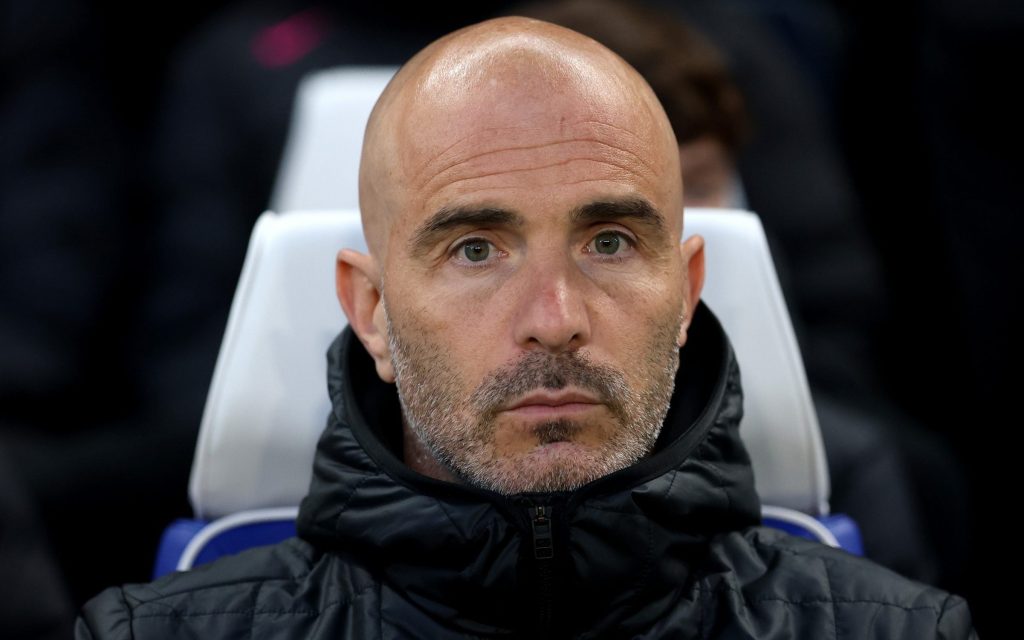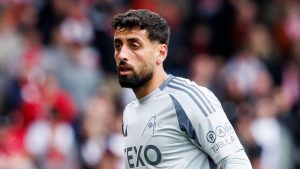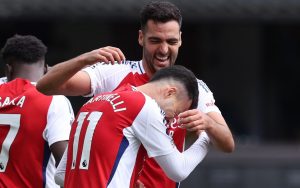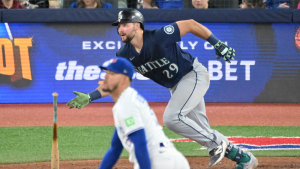
There was good reason that Chelsea investigated the possibility of signing Virgil van Dijk as a free agent this summer, a move that would have broken just about every rule the club’s new ownership has applied to the recruitment of players since January 2023.
Yet Van Dijk occupied an unique position in the game as far as Chelsea were concerned. Or at least he did until terms were finally agreed on a two-year deal last week to stay at Liverpool. He was to be a free agent. He was a Premier League-winning defender and captain of club and country. He was a nailed-on start week in, week out.
Wages? Significantly greater than Chelsea pay the much younger and more inexperienced talents who comprise the target group for their recruitment policy. But then Van Dijk represented something very different.
Enzo Maresca has mentioned it again this week: a lack of experienced leadership types in Chelsea’s squad capable of helping this unusually young team navigate the choppy waters in which they find themselves. A turbulence not helped by injuries and suspensions, with five wins in the past 16 Premier League games from a high point of second place in December. Even their opponents on Sunday, Fulham, currently have the kind of squad that, although not as old as last season, has a certain ring-craft.
Chelsea need to do something about it. Although how you buy experience for free is not simple. Maresca has the backing of the ownership consortium, led day to day by Behdad Eghbali of Clearlake Capital, who was at Stamford Bridge on Thursday for the defeat by Legia Warsaw. There is currently no appetite for a fourth managerial sacking to be added to the count under the Eghbali-Todd Boehly era, but a tweak to the model is not unthinkable.
The question is: if not Van Dijk, then who might add a little seasoning of experience? The free agents this summer include one of Chelsea’s two great missed opportunities of the previous decade, alumnus Kevin De Bruyne. He is a tempting proposition with all the experience of six Premier League titles in the 11 years since he left Chelsea. But De Bruyne, 33, is not a starter at Manchester City. The same would likely be the case at Chelsea.

The problem repeats itself with Thomas Müller, 35, and Luka Modric, 39, all of them 21st-century European greats out of contract in the summer. Experience is plentiful but realistically neither is close to being starters in the Premier League. Under Chelsea’s current model of signing young players on low basic and incentivised salaries, there is no scope for fees on those whose age means that there is no resale value. They are already close to the margins under financial controls and the big revenue boosts – driven potentially by a new stadium – are still far off.
It is the restrictions that they have placed upon themselves, of course, but the wishes of the manager might be hard to resist. Part of the rationale behind their new model that prioritises contract length and gives the club control was the departure of Antonio Rüdiger, as well as Andreas Christensen, as free agents in that 2022 window. Perhaps Rüdiger would have suited that role as a senior man, but was himself spirited away to Real Madrid.
Some clubs have seen their best leaders develop over time. There was Jordan Henderson in the peak Jürgen Klopp years at Liverpool. There is John McGinn at Aston Villa. His two performances against a Paris St-Germain of fast willowy attackers, and elfin midfield precision-passers, showed that a bloody-minded Scotsman with a traditional physique can still have a lot of say in a Champions League quarter-final.

Others have been a more deliberate step outside of a club’s usual recruitment process. Danny Welbeck is by no means the typical Brighton acquisition but crucial nonetheless. Kieran Trippier was transformative at PIF-era Newcastle United. Gareth Barry leant the early Abu Dhabi era at Manchester City a certain gravitas. At 34, as he was then in 2022, Robert Lewandowski was expensive for Barcelona at €45 million but at a club where no one seems to be keeping count, he has been one of the better signings.
One year later Bayern Munich paid even more for Harry Kane, whom Daniel Levy would never have countenanced selling to Chelsea and whom – because of age and wages – Chelsea would never have countenanced buying.
Chelsea will have to make a decision on whether they are prepared to pay something, or nothing at all, for the experience that Maresca says that the squad is lacking. Their big play on experience, the £50 million for Raheem Sterling, and the accompanying five-year contract, did not yield the results they had hoped. That deal, in the first summer of the new ownership, has shaped subsequent policy and still has two expensive years to run.
Either way their manager has been quite clear about what he wants. Maresca has at times been at odds with the supporters and the general mood at Stamford Bridge. He has criticised his captain Reece James for his leadership – or lack of it. The strongest voice in the dressing room has been Tosin Adarabioyo, just 27 and not always in the team. A lot of players of varying levels of experience have left, including Conor Gallagher, Mateo Kovacic, Mason Mount and Kai Havertz. With mixed results elsewhere, it should also be said. That came on top of the departures of N’Golo Kanté and Jorginho.
Chelsea may yet do enough to secure a Champions League place in their final six games of the season, as well as a European trophy, which will be vindication enough for the new approach. As Maresca said on Thursday the team have spent more time in the Champions League places this season than their predecessors had in the previous two years. The emergence of Cole Palmer, the pick of the signings, albeit mid-slump currently, has shown what is possible. But the kind of experience that Maresca is after, is just as hard to find.

There was good reason that Chelsea investigated the possibility of signing Virgil van Dijk as a free agent this summer, a move that would have broken just about every rule the club’s new ownership has applied to the recruitment of players since January 2023.
Yet Van Dijk occupied an unique position in the game as far as Chelsea were concerned. Or at least he did until terms were finally agreed on a two-year deal last week to stay at Liverpool. He was to be a free agent. He was a Premier League-winning defender and captain of club and country. He was a nailed-on start week in, week out.
Wages? Significantly greater than Chelsea pay the much younger and more inexperienced talents who comprise the target group for their recruitment policy. But then Van Dijk represented something very different.
Enzo Maresca has mentioned it again this week: a lack of experienced leadership types in Chelsea’s squad capable of helping this unusually young team navigate the choppy waters in which they find themselves. A turbulence not helped by injuries and suspensions, with five wins in the past 16 Premier League games from a high point of second place in December. Even their opponents on Sunday, Fulham, currently have the kind of squad that, although not as old as last season, has a certain ring-craft.
Chelsea need to do something about it. Although how you buy experience for free is not simple. Maresca has the backing of the ownership consortium, led day to day by Behdad Eghbali of Clearlake Capital, who was at Stamford Bridge on Thursday for the defeat by Legia Warsaw. There is currently no appetite for a fourth managerial sacking to be added to the count under the Eghbali-Todd Boehly era, but a tweak to the model is not unthinkable.
The question is: if not Van Dijk, then who might add a little seasoning of experience? The free agents this summer include one of Chelsea’s two great missed opportunities of the previous decade, alumnus Kevin De Bruyne. He is a tempting proposition with all the experience of six Premier League titles in the 11 years since he left Chelsea. But De Bruyne, 33, is not a starter at Manchester City. The same would likely be the case at Chelsea.

The problem repeats itself with Thomas Müller, 35, and Luka Modric, 39, all of them 21st-century European greats out of contract in the summer. Experience is plentiful but realistically neither is close to being starters in the Premier League. Under Chelsea’s current model of signing young players on low basic and incentivised salaries, there is no scope for fees on those whose age means that there is no resale value. They are already close to the margins under financial controls and the big revenue boosts – driven potentially by a new stadium – are still far off.
It is the restrictions that they have placed upon themselves, of course, but the wishes of the manager might be hard to resist. Part of the rationale behind their new model that prioritises contract length and gives the club control was the departure of Antonio Rüdiger, as well as Andreas Christensen, as free agents in that 2022 window. Perhaps Rüdiger would have suited that role as a senior man, but was himself spirited away to Real Madrid.
Some clubs have seen their best leaders develop over time. There was Jordan Henderson in the peak Jürgen Klopp years at Liverpool. There is John McGinn at Aston Villa. His two performances against a Paris St-Germain of fast willowy attackers, and elfin midfield precision-passers, showed that a bloody-minded Scotsman with a traditional physique can still have a lot of say in a Champions League quarter-final.

Others have been a more deliberate step outside of a club’s usual recruitment process. Danny Welbeck is by no means the typical Brighton acquisition but crucial nonetheless. Kieran Trippier was transformative at PIF-era Newcastle United. Gareth Barry leant the early Abu Dhabi era at Manchester City a certain gravitas. At 34, as he was then in 2022, Robert Lewandowski was expensive for Barcelona at €45 million but at a club where no one seems to be keeping count, he has been one of the better signings.
One year later Bayern Munich paid even more for Harry Kane, whom Daniel Levy would never have countenanced selling to Chelsea and whom – because of age and wages – Chelsea would never have countenanced buying.
Chelsea will have to make a decision on whether they are prepared to pay something, or nothing at all, for the experience that Maresca says that the squad is lacking. Their big play on experience, the £50 million for Raheem Sterling, and the accompanying five-year contract, did not yield the results they had hoped. That deal, in the first summer of the new ownership, has shaped subsequent policy and still has two expensive years to run.
Either way their manager has been quite clear about what he wants. Maresca has at times been at odds with the supporters and the general mood at Stamford Bridge. He has criticised his captain Reece James for his leadership – or lack of it. The strongest voice in the dressing room has been Tosin Adarabioyo, just 27 and not always in the team. A lot of players of varying levels of experience have left, including Conor Gallagher, Mateo Kovacic, Mason Mount and Kai Havertz. With mixed results elsewhere, it should also be said. That came on top of the departures of N’Golo Kanté and Jorginho.
Chelsea may yet do enough to secure a Champions League place in their final six games of the season, as well as a European trophy, which will be vindication enough for the new approach. As Maresca said on Thursday the team have spent more time in the Champions League places this season than their predecessors had in the previous two years. The emergence of Cole Palmer, the pick of the signings, albeit mid-slump currently, has shown what is possible. But the kind of experience that Maresca is after, is just as hard to find.











